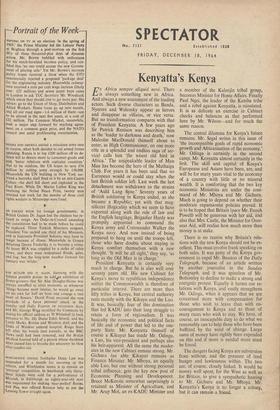Kenyatta's Kenya
x Africa semper aliquid novi. There .Ed is always something new in Africa. And always a new assessment of the leading actors. Such diverse characters as Banda, Nyerere and Welensky appear as heroes and disappear as villains, or vice versa. But no transformation compares with that of President Kenyatta. A few years ago Sir Patrick Renison was describing him as the 'leader to darkness and death,' now Malcolm MacDonald (himself about to enter, as High Commissioner, on one more role in a splendid and endless saga of ser- vice) calls him 'the wisest old bird in Africa.' The unspeakable leader of Mau Mau has become the hero of the Muthaiga Club. For years it has been said that no European would or could stay when the last British soldier left. Last week the last detachment was withdrawn to the strains of 'Auld Lang Syne.' Seventy years of British soldiering in Kenya ended, as she became a Republic; yet with that mag- nificent illogicality which we seem to have exported along with the rule of law and the English langtiage, Brigadier Hardy was promptly appointed . to command the Kenya army and Commander Walker the Kenya navy. And now instead of being prepared to hang on until the troops left, those who have doubts about staying in Kenya comfort themselves with a new thought. 'It will be all right,' they say, 'as long as the Old Man is in charge.'
President Kenyatta is certainly very much in charge. But he is also well over seventy years old. His new Cabinet for Kenya's move to republican independence within the Commonwealth is therefore of particular interest. There are more than fifty tribes in Kenya, but central authority rests mainly with the Kikuyu and the Luo. It was, basically, fear of this domination that led KADU into their long struggle to retain a form of regionalism. It was basically the economic and political facts of life and of power that led to the one- party State. Mr. Kenyatta (himself of course a Kikuyu) has made Mr. Odinga, a Luo, his vice-president and perhaps also his heir-apparent. All the same the moder- ates in the new Cabinet remain strong. Mr. Gichuru (an able Kikuyu) remains as Finance Minister. Mr. Mboya, an equally able Luo, but one without strong personal tribal influence, gets the key new post of Economic Planning and Development. Bruce McKenzie somewhat surprisingly is retained as Minister of Agriculture, and Mr. Arap Moi, an ex-KADU Minister and a member of the Kalenjin tribal group, becomes Minister for Home Affairs. Finally Paul Ngei, the leader of the Kamba tribe and a rebel against Kenyatta, is reinstated. It is as delicate an exercise in Cabinet checks and balances as that performed here by Mr. Wilson—and for much the same reason.
The central dilemma for Kenya's future remains.. Mr. Segal writes in this issue of `the incompatible goals of rapid economic growth and Africanisation of the economy:. Mr. Odinga is certainly in the second camp, Mr. Kenyatta almost certainly in the first. The skill and capital of Kenya's Europeans and Asians have been, are, and will be for many years vital to the economy of a country with little or no mineral wealth. It is comforting that the two key economic Ministries are under the com- mand of Mr. Mboya and Mr. Gichuru. Much is going to depend on whether their moderate expansionist policies prevail. It is to be hoped that Britain (pace Mr. Enoch Powell) will be generous with her aid, and also that Mrs. Castle, the Minister for Over- seas Aid, will realise how much more than money is at stake.
There is no reason why Britain's rela- tions with the new Kenya should not be ex- cellent. This must involve frank speaking on both sides. It was petty of the Kenya gov- ernment to expel Mr. Beeston of the Daily Telegraph, because of an article written by another journalist in the Sunday Telegraph, and it was spineless of Mr. Bottomley to decline to make a strong and energetic protest. Equally it harms our re- lations with Kenya, and vastly strengthens Mr. Odinga, when it appears that we are concerned more with compensation for those who wish to. leave than with en- couragement to Kenya and to those of many races who wish to stay. We have, of course, an inescapable duty to do what we reasonably can to help those who have been buffeted by the wind of change. Large sums of money have rightly been expended on this and if more is needed more must be found.
The dangers facing Kenya are subversion from without, and the pressure of land hunger and lawlessness within. The two are, of course, closely linked. It would be money well spent, for the West as well as for .Britain, to give a sympathetic hearing to Mr. Gichuru and Mr. Mboya. Mr. Kenyatta's Kenya is no longer a colony, but it can remain a friend.




























 Previous page
Previous page